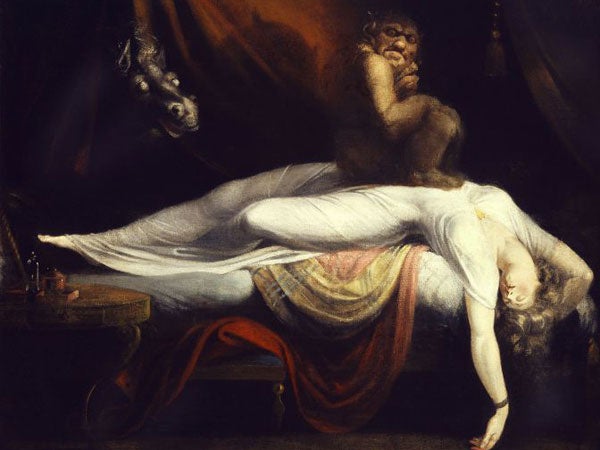The art of love: Henry Fuseli
Where sex and fear meet

Your support helps us to tell the story
From reproductive rights to climate change to Big Tech, The Independent is on the ground when the story is developing. Whether it's investigating the financials of Elon Musk's pro-Trump PAC or producing our latest documentary, 'The A Word', which shines a light on the American women fighting for reproductive rights, we know how important it is to parse out the facts from the messaging.
At such a critical moment in US history, we need reporters on the ground. Your donation allows us to keep sending journalists to speak to both sides of the story.
The Independent is trusted by Americans across the entire political spectrum. And unlike many other quality news outlets, we choose not to lock Americans out of our reporting and analysis with paywalls. We believe quality journalism should be available to everyone, paid for by those who can afford it.
Your support makes all the difference.Henry Fuseli: 'The Nightmare', 1781, Detroit Institute of the Arts
Swathed in the most clinging of white shifts, a woman lies flopped, voluptuous, unconscious exposed full length along the bed and across the picture. Our eyes can trace her soft, swelling, undulating form from the tip of her toe to the tip of her finger. On her belly, half-materialising from shadow, squats a hideous, hunched, troll-like beast, an incubus. And plunging through the bed curtains, suddenly, with burning eyes, comes the ghostly head of a horse.
But who in Fuseli's Nightmare is the fantasy, and who is the fantasiser? The scene may look like Gothic going on Freud, illustrating how fears mix with desires. The sleeping woman is the consciousness at work. This dark monster of lust is a phantasm dreamt up by her restless, welcoming sex-mad mind.
Yet the incubus is more than a vision. It is an active creature, with a mental life of its own. It isn't actually doing anything. It's just sat on her, inert, like a monkey-ornament not performing a horrible act, but (which is worse) with some calm and horrible purpose. It turns its bug-eyes to meet the viewer's in a way that implies complicity. So this totally available woman may be the creature of its fantasy, and ours.
And that horse, bursting in like a visual scream, could be anyone's climactic cry.
Join our commenting forum
Join thought-provoking conversations, follow other Independent readers and see their replies
Comments